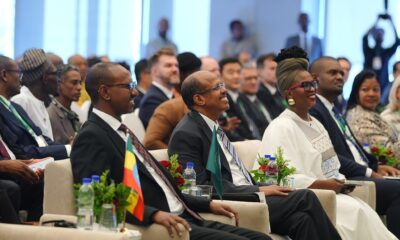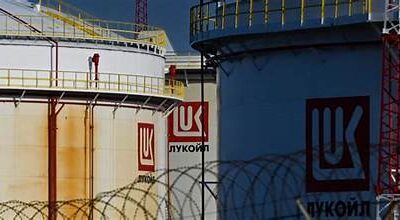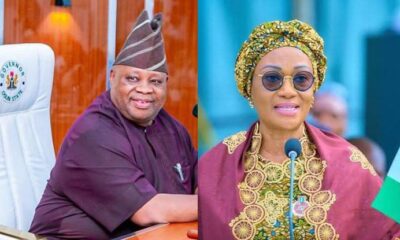Breaking News
2023 Presidential Election: 6 PDP states ask S’ Court to order review of results
Though no date has been fixed for the matter to be heard, however, the states, in processes they filed through their team of lawyers led by Chief Mike Ozekhome, SAN, prayed for an order for accelerated hearing of the case.

Six States of the federation have approached the Supreme Court to challenge the outcome of the just concluded Presidential and National Assembly elections.
The States- Adamawa State, Akwa Ibom State, Bayelsa State, Delta State, Edo State and Sokoto- through their respective Attorneys-General, alleged the Independent National Electoral Commission, INEC, acted in breach of the Electoral Act, 2022.
The plaintiffs maintained that election results from the 36 states of the federation and the FCT, were not properly transmitted and collated by INEC, as prescribed by the Electoral Act.
The six states, which are currently under the control of the opposition Peoples Democratic Party, PDP, in the suit marked: SC/CV/354/2023, further alleged that INEC pulled down its portal harbouring the Regulations and Guidelines it earlier set for the elections.
Consequently, they applied for an order of the apex court, mandating “a holistic review of all results so far announced by the Federal Government of Nigeria through the INEC which were carried out other than through the manner prescribed by the provisions of the Electoral Act, 2022, the INEC Regulations and Guidelines for the Conduct of Elections, 2022; and the INEC Manual for Election Officials”.
“A declaration that the Federal Government of Nigeria, the INEC, was bound to electronically transmit or transfer Polling Unit Results in Form EC8A using BVAS by uploading Scanned Copy of the said Unit Result to the Independent National Electoral Commission Result Viewing Portal (IReV) in the course of the General Elections held on the 25th of February, 2023 throughout the Federation in compliance with the provision of Sections 25; 47(2); 60 (1), (2), (4) & (5); 62; 64(4)(a) & (b); 70; and 148 of the Electoral Act, 2022, governing the 2023 nationwide general elections, particularly paragraphs 38 of the INEC Regulations and Guidelines for the Conduct of Elections, 2022; and paragraphs 2.8.4; 2.9.0; and 2.9.1 of the INEC Manual for Election Officials, 2023, for the conduct of the Presidential Election.
“A declaration that the failure of the Federal Government of Nigeria, the INEC, to electronically transmit or transfer Polling Unit Results in Form EC8A using BVAS by uploading Scanned Copy of the said Unit Result to the Independent National Electoral Commission Result Viewing Portal (IReV) after the counting and announcement of the Polling Units results on 25th of February, 2023 in collusion, violates the provision of Sections 25; 47(2); 60 (1), (2), (4) & (5); 62; 64(4)(a) & (b); 70; and 148 of the Electoral Act, 2022, governing the 2023 nationwide general elections, particularly paragraphs 38 of the INEC Regulations and Guidelines for the Conduct of Elections, 2022; and paragraphs 2.8.4; 2.9.0; and 2.9.1 of the INEC Manual for Election Officials, 2023, for the conduct of the Presidential Election.
“A declaration that the fundamentally flawed electoral process through the non-uploading of the results of each of the 176,974 Polling Units nationwide, in respect of the Presidential Election and National Assembly Elections held on Saturday, 25th February 2023 were not in accordance with the provisions of Sections 25; 47(2); 60 (1), (2), (4) & (5); 62; 64(4)(a) & (b); 70; and 148 of the Electoral Act, 2022, governing the 2023 nationwide general elections, particularly paragraphs 38 of the INEC Regulations and Guidelines for the Conduct of Elections, 2022; and paragraphs 2.8.4; 2.9.0; and 2.9.1 of the INEC Manual for Election Officials, 2023, for the conduct of the Presidential Election.
“A declaration that the entire results of the Presidential Election conducted on the 25th of February, 2023 announced by the Chairman of the Independent National Electoral Commission at the National Collation Centre, Abuja, in flagrant provision of Sections 25; 47(2); 60 (1), (2), (4) & (5); 62; 64(4)(a) & (b); 70; and 148 of the Electoral Act, 2022, governing the 2023 nationwide general elections, particularly paragraphs 38 of the INEC Regulations and Guidelines for the Conduct of Elections, 2022; and paragraphs 2.8.4; 2.9.0; and 2.9.1 of the INEC Manual for Election Officials, 2023, for the conduct of the Presidential Election, were invalid, null and void, and of no effect whatsoever”.
As well as an order, “directing a wholistic review of all results so far announced by the Federal Government of Nigeria through the Independent National Electoral Commission (INEC) which were carried out other than through the manner prescribed by the provisions of the Electoral Act, 2022, the INEC Regulations and Guidelines for the Conduct of Elections, 2022; and the INEC Manual for Election Officials”.
Though no date has been fixed for the matter to be heard, however, the states, in processes they filed through their team of lawyers led by Chief Mike Ozekhome, SAN, prayed for an order for accelerated hearing of the case.
It will be recalled that INEC had declared Bola Tinubu of the ruling All Progressives Congress, APC, as winner of the presidential election.
Tinubu defeated 17 other candidates who took part in the election.
He scored a total of 8,794,726 votes to defeat Atiku Abubakar of the PDP who polled a total of 6,984,520 votes and Peter Obi of the Labour Party, who came third with a total of 6,101,533 votes.
Both PDP and LP have since rejected the outcome of the presidential election, just as they expressed readiness to challenge it in court.










